Introduction
Assuming we have developed a complex report for the Quotation entity in the system (implemented via SSRS), this report primarily serves as a quotation template for sales to present to customers. However, currently, the method of calling this report is through the standard report button, which requires users to select the report after clicking the button. This method presents a problem: in the report export interface, users can choose various export formats such as Excel, Word, and PDF, which does not comply with management standards. The client has requested that sales can only export to PDF, leading to the creation of this article.
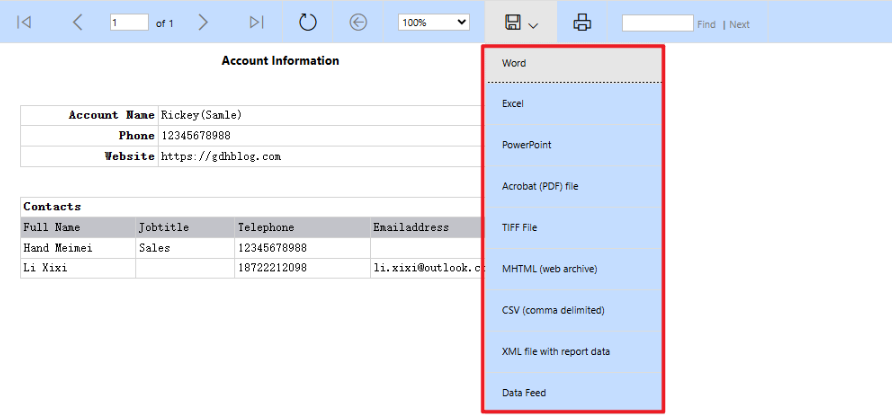
On a side note, this requirement is quite understandable. Currently, users can select to export the quotation to Excel, which can lead to offline modifications and then exporting to PDF based on that Excel. Although users can still edit the PDF, there’s little that can be done about it at this point; we can only prevent the honest from being misled by the dishonest.
There are generally two methods:
- Front-end PDF Generation: This can utilize third-party JS libraries (like PrintJS) to design and implement it, along with adding a custom button for invocation.
- Add Custom Button: Directly export the existing report in PDF format.
For the first method, if the project is in its early stages and the report is not yet complete, this approach can be chosen. However, if a considerable amount of time and effort has already been invested in the existing report, abandoning it outright is clearly not wise. Therefore, we have decided to adopt the second method.
Results
- Click the export button (custom).

- Open the downloaded PDF file.
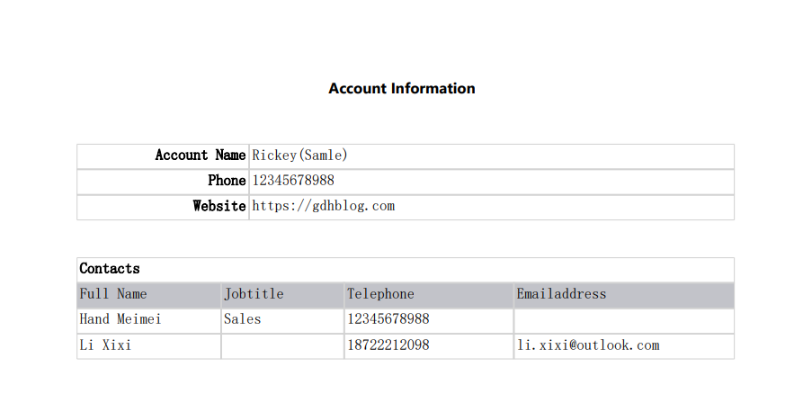
Implementation
Assumptions
Assume we have added a custom SSRS report to the Customer form: PrintAccount.rdl.

Step 1: Add Account.js Script
P.S:
- Don’t forget to publish after adding.
- For detailed
account.jscode, please refer to the appendix below.

Step 2: Add Custom Button
Here, I am using the new button editing interface. Of course, you can also use Ribbon Workbench to add the button; achieving the goal is what matters.
Open the solution, go to Model Driven App, and select “Edit Command Bar.”
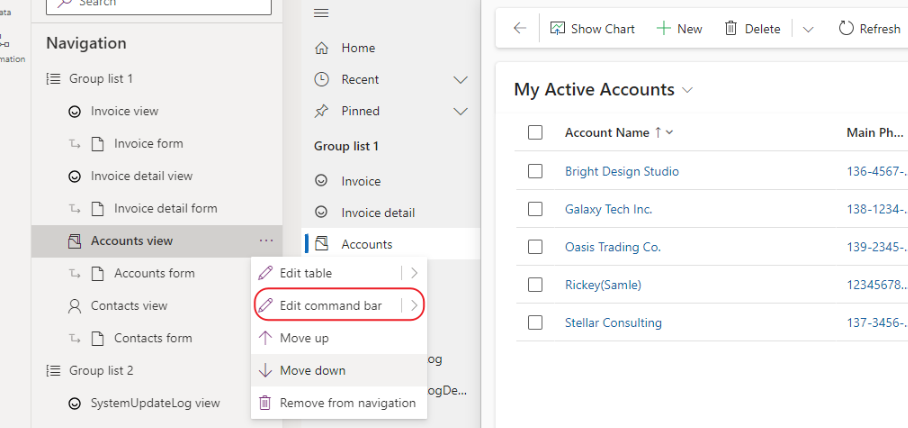
Select “Main Form.”
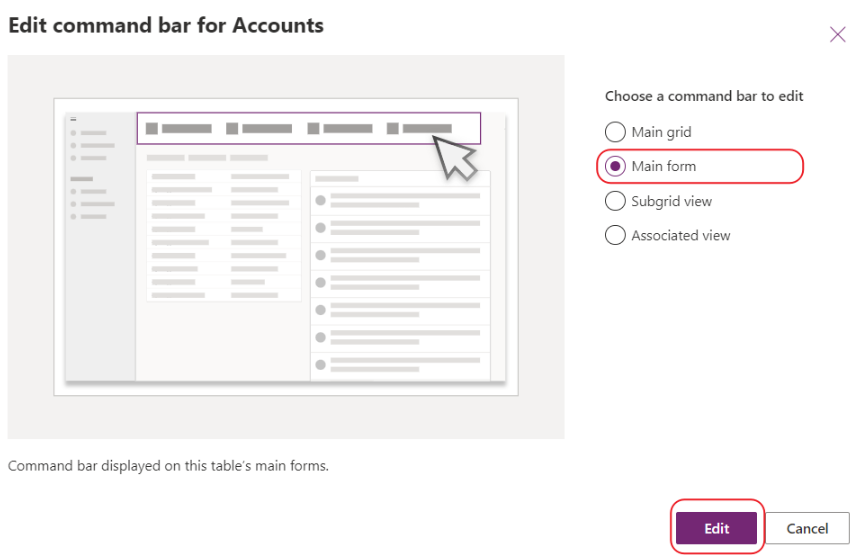
Bind Account.js and fill in the relevant properties.
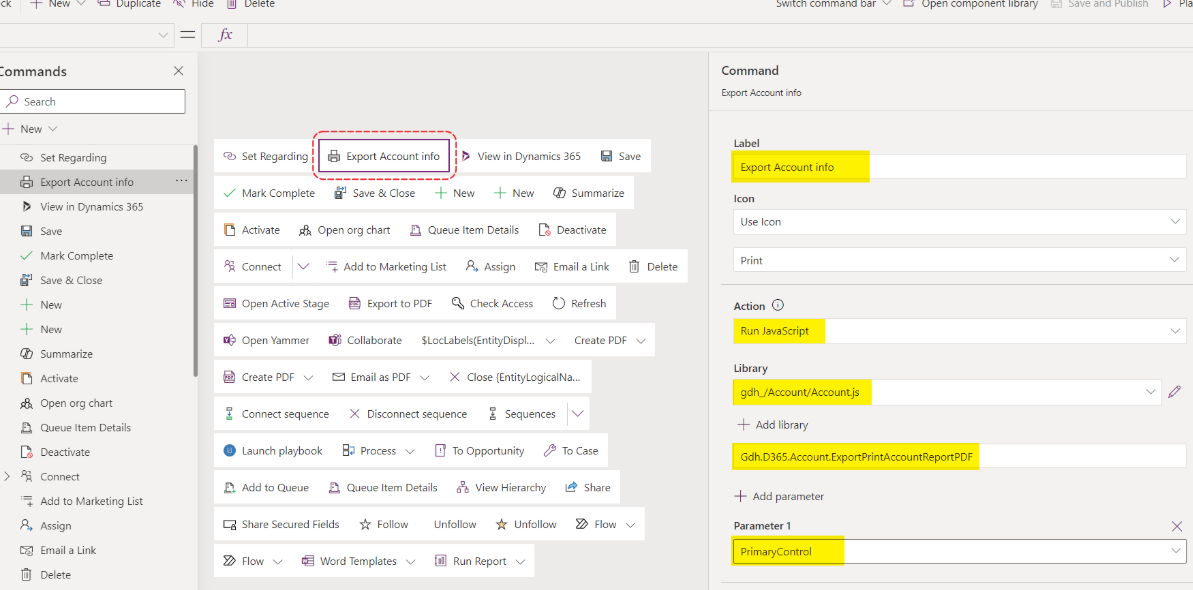
Finally, save and publish.
Additional Notes
Why Not Use the System’s Standard Function to Generate PDF?
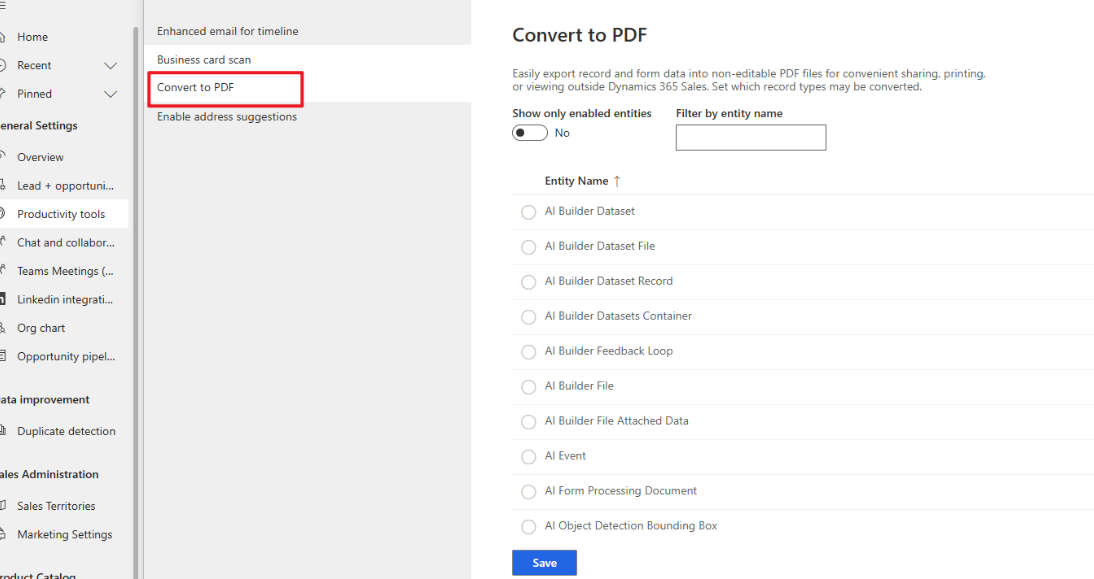
The “Convert to PDF” function is actually quite similar to configuring Word templates, and both have a drawback: associated sub-tables will be displayed regardless of their status, whether active or inactive. For example, in a one-to-many relationship between the Customer and Contact entities, if we configure a Word template on the Customer entity, the template content includes fields from the Customer entity as well as a list of contacts associated with the current customer. Now, if we use “Convert to PDF” to convert the Word template, and the current customer has 10 contacts (2 of which are inactive), the generated PDF or Word document will still display those 2 inactive contacts.
Where to Find CRM_FilteredAccount in the Code?
This is actually the report parameter.

Appendix
Account/Account.js
/**
* Account Entity Javascript.
*/
if (Gdh === undefined) { var Gdh = {}; }
if (Gdh.D365 === undefined) { Gdh.D365 = {}; }
Gdh.D365.Account = (function () {
'use strict';
return {
Constants: {
Fields: {
AccountName: "name",
Phone: "telephone1",
Fax: "fax",
Website: "websiteurl",
},
Reports: {
PrintAccountReport: "PrintAccount.rdl",
},
SystemAdminId: "SystemAdminId",
},
OnLoad: function (ExecutionContext) {
try {
let objFormContext = ExecutionContext.getFormContext();
} catch (e) {
console.error("Error during OnLoad: ", e);
}
},
ExportPrintAccountReportPDF: function (primaryControl) {
let objFormContext = primaryControl;
let CurrentAccountId = objFormContext.data.entity.getId().replace("{", "").replace("}", "");
let that = this;
console.log(CurrentAccountId, CurrentAccountId);
let selectAttributes = `${that.Constants.Fields.AccountName}`;
console.log(selectAttributes, selectAttributes);
let accountEn = this.RetrieveSingleRecord("accounts", CurrentAccountId, selectAttributes);
let accountName = accountEn[this.Constants.Fields.AccountName];
// CRM_FilteredAccount -> SSRS report argument
let reportPrefilter = "CRM_FilteredAccount=" + "<fetch version='1.0' output-format='xml-platform' mapping='logical' distinct='false'>" +
"<entity name='account'>" +
" <all-attributes />" +
" <filter type='and'>" +
" <condition attribute='accountid' operator='eq' value='" + CurrentAccountId + "' />" +
" </filter>" +
"</entity>" +
"</fetch>";
let arrReportSession = this.ExecuteReport(this.Constants.Reports.PrintAccountReport, reportPrefilter);
this.Get_SSRS_Report_PDFBase64(arrReportSession, 2052).then(function (base64String) {
// Size of the file in KB
let fSize = (encodeURIComponent(base64String).replace(/%../g, 'x').length) / 1024;
let openFileOptions = { openMode: 2 };
let file = {};
file.fileContent = base64String;
file.fileSize = fSize;
// Set file name
file.fileName = accountName + " - Info" + ".pdf";
file.mimeType = "application/pdf";
Xrm.Navigation.openFile(file, openFileOptions);
}).catch(function (error) {
console.error(error);
});
},
GetReportIdByReportFileName: function (reportFileName) {
let lValue = "";
let lResponse = this.RetrieveMultipleRecord("reports", "filename eq '" + reportFileName + "'", "reportid", false);
if (lResponse !== null && lResponse !== undefined && lResponse.value.length > 0) {
lValue = lResponse.value[0]["reportid"];
}
return lValue;
},
ExecuteReport: function (reportFileName, reportPrefilter) {
let reportGuid = this.GetReportIdByReportFileName(reportFileName);
let pth = this.GetClientUrl() + "/CRMReports/rsviewer/ReportViewer.aspx";
let orgUniqueName = Xrm.Utility.getGlobalContext().getOrgUniqueName();
let query = "id=%7B" + reportGuid +
"%7D&uniquename=" + orgUniqueName +
"&iscustomreport=true&reportnameonsrs=&reportName=" + reportFileName +
"&isScheduledReport=false&p:" + reportPrefilter;
let retrieveEntityReq = new XMLHttpRequest();
retrieveEntityReq.open("POST", pth, false);
retrieveEntityReq.setRequestHeader("Accept", "*/*");
retrieveEntityReq.setRequestHeader("Content-Type", "application/x-www-form-urlencoded");
retrieveEntityReq.send(query);
let x = retrieveEntityReq.responseText.lastIndexOf("ReportSession=");
let y = retrieveEntityReq.responseText.lastIndexOf("ControlID=");
let ret = [];
ret[0] = retrieveEntityReq.responseText.slice(x + 14, x + 14 + 24);
ret[1] = retrieveEntityReq.responseText.slice(y + 10, y + 10 + 32);
return ret;
},
/**
*
* @param {any} arrResponseSession
* @param {any} lcId (Language code)
* @returns
*/
Get_SSRS_Report_PDFBase64: function (arrResponseSession, lcId) {
let that = this;
return new Promise(function (resolve, reject) {
let pth = that.GetClientUrl() + "/Reserved.ReportViewerWebControl.axd?ReportSession=" + arrResponseSession[0] + "&Culture=" + lcId + "&CultureOverrides=True&UICulture=" + lcId + "&UICultureOverrides=True&ReportStack=1&ControlID=" + arrResponseSession[1] + "&OpType=Export&FileName=Public&ContentDisposition=OnlyHtmlInline&Format=PDF";
let retrieveEntityReq = new XMLHttpRequest();
retrieveEntityReq.open("GET", pth, true);
retrieveEntityReq.setRequestHeader("Accept", "*/*");
retrieveEntityReq.responseType = "arraybuffer";
retrieveEntityReq.onreadystatechange = function () {
if (retrieveEntityReq.readyState == 4 && retrieveEntityReq.status == 200) {
let binary = "";
let bytes = new Uint8Array(this.response);
for (let i = 0; i < bytes.byteLength; i++) {
binary += String.fromCharCode(bytes[i]);
}
let base64PDFString = btoa(binary);
resolve(base64PDFString);
}
};
retrieveEntityReq.send();
});
},
GetClientUrl: function () {
let lGlobalContext = "";
try {
lGlobalContext = Xrm.Utility.getGlobalContext();
}
catch (e) {
lGlobalContext = parent.Xrm.Utility.getGlobalContext();
}
if (lGlobalContext !== null) {
return lGlobalContext.getClientUrl();
}
return null;
},
RetrieveMultipleRecord: function (lEntityName, lFilter, lCommaSeparatedAttributeNames, isAdmin) {
let lResponse = null;
let lXMLHttpRequest = new XMLHttpRequest();
lXMLHttpRequest.open("GET", this.GetClientUrl() + "/api/data/v9.2/" + lEntityName + "?$select=" + lCommaSeparatedAttributeNames + "&$filter=" + lFilter, false);
lXMLHttpRequest.setRequestHeader("OData-MaxVersion", "4.0");
lXMLHttpRequest.setRequestHeader("OData-Version", "4.0");
lXMLHttpRequest.setRequestHeader("Accept", "application/json");
lXMLHttpRequest.setRequestHeader("Content-Type", "application/json; charset=utf-8");
lXMLHttpRequest.setRequestHeader("Prefer", "odata.include-annotations=\"*\"");
// If IsAdmin is true, it is executed as an administrator
if (isAdmin) {
lXMLHttpRequest.setRequestHeader("MSCRMCallerID", this.GetConfigurationValue(this.Constants.SystemAdminId));
}
lXMLHttpRequest.onreadystatechange = function () {
if (this.readyState === 4) {
lXMLHttpRequest.onreadystatechange = null;
if (this.status === 200) {
lResponse = JSON.parse(this.response);
} else {
Xrm.Navigation.openAlertDialog("An exception has occurred, please contact the system administrator.");
console.log("Error:");
console.log(this.statusText);
}
}
};
lXMLHttpRequest.send();
return lResponse;
},
RetrieveSingleRecord: function (lEntityName, lEntityId, lCommaSeparatedAttributeNames, admin) {
let lResponse = null;
let lXMLHttpRequest = new XMLHttpRequest();
lXMLHttpRequest.open("GET", this.GetClientUrl() + "/api/data/v9.2/" + lEntityName + "(" + lEntityId + ")" + "?$select=" + lCommaSeparatedAttributeNames, false);
lXMLHttpRequest.setRequestHeader("OData-MaxVersion", "4.0");
lXMLHttpRequest.setRequestHeader("OData-Version", "4.0");
lXMLHttpRequest.setRequestHeader("Accept", "application/json");
lXMLHttpRequest.setRequestHeader("Content-Type", "application/json; charset=utf-8");
lXMLHttpRequest.setRequestHeader("Prefer", "odata.include-annotations=\"*\"");
if (admin) {
lXMLHttpRequest.setRequestHeader("MSCRMCallerID", this.GetConfigurationValue(this.Constants.SystemAdminId));
}
lXMLHttpRequest.onreadystatechange = function () {
if (this.readyState === 4) {
lXMLHttpRequest.onreadystatechange = null;
if (this.status === 200) {
lResponse = JSON.parse(this.response);
} else {
Xrm.Navigation.openAlertDialog("An exception has occurred, please contact the system administrator.");
console.log("Error:");
console.log(this.statusText);
}
}
};
lXMLHttpRequest.send();
return lResponse;
},
/**
* Get Configuration Value
* P.S: This is my own new configuration entity, there are two main fields: (1) name , (2) value.
* if you need to use, please create and modify the following field information
* @param {any} configName
* @returns
*/
GetConfigurationValue: function (configName) {
let lValue = "";
let lResponse = this.RetrieveMultipleRecord("Your Config Entity Logical Collection Name", "gdh_name eq '" + configName + "'", "gdh_value");
if (lResponse !== null && lResponse !== undefined && lResponse.value.length > 0) {
lValue = lResponse.value[0][this.Constants.ConfigurationsField.Value];
}
return lValue;
},
}
})();

Comments